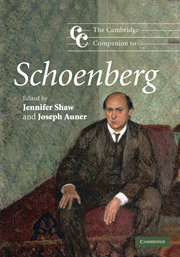Book contents
- Frontmatter
- 1 Introduction
- Part I Schoenberg's early years
- Part II Schoenberg, modernism, and modernity
- Part III Schoenberg between the World Wars
- 10 Schoenberg as teacher
- 11 Schoenberg, satire, and the Zeitoper
- 12 Schoenberg's row tables: temporality and the idea
- 13 Immanence and transcendence in Moses und Aron
- 14 Schoenberg, the Viennese-Jewish experience and its aftermath
- Part IV Schoenberg's American years
- Notes
- Select bibliography
- Index
10 - Schoenberg as teacher
from Part III - Schoenberg between the World Wars
Published online by Cambridge University Press: 28 September 2011
- Frontmatter
- 1 Introduction
- Part I Schoenberg's early years
- Part II Schoenberg, modernism, and modernity
- Part III Schoenberg between the World Wars
- 10 Schoenberg as teacher
- 11 Schoenberg, satire, and the Zeitoper
- 12 Schoenberg's row tables: temporality and the idea
- 13 Immanence and transcendence in Moses und Aron
- 14 Schoenberg, the Viennese-Jewish experience and its aftermath
- Part IV Schoenberg's American years
- Notes
- Select bibliography
- Index
Summary
Schoenberg's impact as a composer is rivaled by his remarkable legacy as a teacher. Among the hundreds of students he taught in Europe and the United States, many went on to distinguished careers as composers, performers, and teachers in their own right; many more were left with an indelible impression of the encounter. The deep devotion Schoenberg inspired in his pupils is evident in their accounts which reveal a brilliant, generous, and indefatigable teacher who could also be an authoritarian, capable of sarcasm and even intimidation. Something of the intensity of his relationship with his students can be gleaned from Heinrich Jalowetz's comments in a testimonial volume from 1912:
Schoenberg educates the pupils in the fullest sense of the word and involuntarily establishes such compelling personal contact with each one that his pupils gather around him like disciples about their master. And if we call ourselves “Schoenberg pupils,” this has a completely different emphasis from what it does for those who are inseparably linked to their teacher by virtue of a fingering that will make him happy, or the creation of a new figured bass. We know, rather, that all of us who call ourselves Schoenberg pupils are touched by his essence in everything that we think and feel and that we thereby feel in a kind of spiritual contact with everything. For anyone who was his pupil, his name is more than a recollection of student days; it is an artistic and personal conscience.
- Type
- Chapter
- Information
- The Cambridge Companion to Schoenberg , pp. 135 - 146Publisher: Cambridge University PressPrint publication year: 2010



